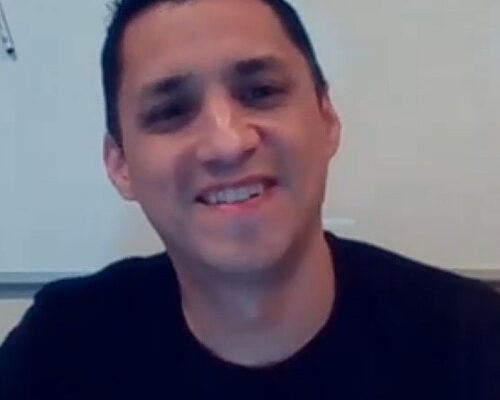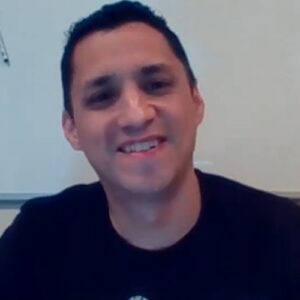
Angel Rodriguez: The Power of Nurturing STEM in Schools
April 2021
 Angel is a third year PhD Candidate in Mechanical Engineering and has been a part of both Bay Area Scientists in Schools and Be A Scientist programs!
Angel is a third year PhD Candidate in Mechanical Engineering and has been a part of both Bay Area Scientists in Schools and Be A Scientist programs!
What led you to pursue a Phd in mechanical engineering?
I’ve been in the Navy for over 20 years, and am still serving. I was a Submarine Nuclear Warfare Officer, so that’s where my love and appreciation for science and engineering came out. The Navy combined my love for math and science and also wanting to serve my country. I got to focus on nuclear engineering, air systems, [and] habitability systems on submarines, and really appreciate the complexities in terms of being able to support living underwater for so many months. I got to a point where I wanted to shift, because I always wanted to be a university professor. I loved math growing up and always wanted to teach math or science. I applied for this Navy program where you get a doctoral degree then teach at the US Naval Academy, so I’ll be transitioning to teach in the Mechanical Engineering Department.
What inspired your love for math and science growing up?The movie Stand and Deliver with Jaime Escalonte always inspired me to give back and to understand that being a member of an underrepresented community, sometimes you feel that you start off already in a bad spot in terms of opportunities or exposure to the STEM field.
I think the sooner we start nurturing that talent and curiosity at a young age I think it will grow to become fruitful when these students are in higher education and then open their eyes to work in something they’ve loved since they were young.
What continues to bring wonder into your work?
As a researcher, I’m able to take theories that you learn in books or class and I’m able to validate them and prove through complex experiments that the science and mathematical equations match up. In my research, I x-ray bubbles and different phases of water in a pipe that you can’t see through…The x-ray tells me what the inside of the pipe looks like. I find it fascinating that mathematical equations can reconstruct something from x-rays, and prove that the math works.
Describe a pivotal moment in your career.
My parents had jobs, not careers and they were putting food on the table, sometimes you don’t get the nurturing that you need about career fields to really understand the art of the possible. Just thinking about how big college tuition is makes [college] seem like a mountain to climb over. If I had known (when I graduated high school) how to nurture my talent and continue my studies, it would have been much different. I would have been a Phd and teaching for many years. I think that’s important for youth out there to understand there are ways to fund your education.
What’s one discovery you’ve made?
I am a big believer in leading by example, in making yourself visible and transparent to others. I think it’s important to have those tough conversations with what is the right fit for you. I’m very honest with my children, making sure they understand what is the art of the possible. My kids have several talents and my important role is to nurture that, whatever it is. If I’m not an expert in that field, then I try to find individuals in that field to inspire them. For me to appreciate science, I do it by meeting people that do the same thing that I do, people that can be frank with their journey, the stumbling blocks, the things they’ve learned. It’s an important thing to give our youth, exposure is important. You have to see something to believe what the possibilities are for yourself. (BASIS and Be a Scientist) teach kids to grow confidence in science and not be afraid of it.